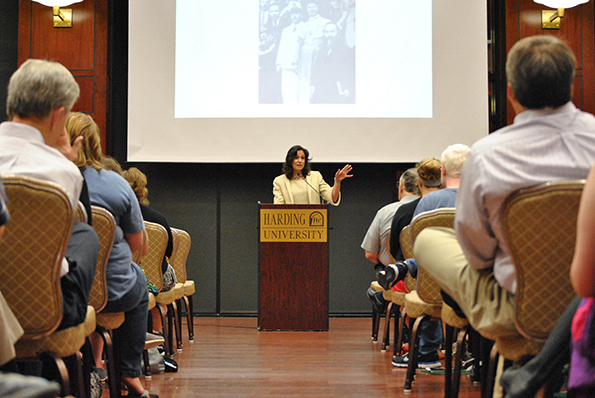The author of “It Happened in Italy: Untold Stories of How the People of Italy Defied the Horrors of the Holocaust” spoke on Aug. 30 as a part of the L.C. Sears Collegiate Seminar Series. While researching the book, Elizabeth Bettina made five trips to Italy with survivors, bringing them back to the villages where they were interred.
Harding University in Florence Director Robbie Shackelford said his father read Bettina’s book and shared it with him. After reading “It Happened in Italy,” Shackelford decided to add Campagna to HUF’s southern Italy trip in the fall of 2011. The following spring, he invited Bettina to accompany the group to Campagna and guide the tour.
“I’m honored to have been invited by Robbie Shackelford and the rest of the Harding Family,” Bettina said. “The trip to Campagna was fantastic and the bond I formed with the students was extraordinary. I’m glad to know that Campagna has become a permanent stop on their itinerary to the south.”
Having Bettina give a guided tour brought the stories of the survivors closer to home for the students. While walking through the streets, the group stopped to talk with residents of Campagna.
“The most memorable part of the trip to Campagna was actually talking to people who were around during the time that the internment camp was happening,” senior Brandi Burton said. “We talked to about four people, who we meton the streets of that town. They were a little taken back by all of these American students who were walking around the town of Campagna. It was also cool to go through the discovery process as Bettina did and unearthing different information that might not be known.”
Junior Emily Davis said she still remembers some of the personal stories shared by the residents of Campagna who lived during World War II.
“While we were on the tour, I saw these two old men who were about 90 years old,” Davis said. “They didn’t speak any English, but after some translating we found out that one was a survivor from Auschwitz and another was a survivor from Dachau. Because of Elizabeth, I got to meet someone who survived Auschwitz. She knew everyone in Campagna and had a personal piece behind every piece of history.”
Bettina first learned of the concentration camps in southern Italy after finding an old photo of a rabbi standing on the steps of a Catholic church in Campagna, where her family is from. What was a rabbi doing in Campagna? The photo led her to begin to learn more about what happened in Campagna and Italy during World War II.
During the 1930s and 1940s, foreign many Jews moved to Italy to escape the religious persecution going on in Germany, Austria and France. However, after the war broke out, the foreign Jews in Italy were rounded up and sent to camps.
“Italian run camps before Sept. 8, 1943 were different from German run camps,” Bettina said. “They were not death camps, they were not starvation camps. They were more like being detained. Some foreign Jews were sent to live in sall towns with restrictions.”
The Italian Jews were not sent to camps and lived in their own homes until after Sept. 8, 1943 when Italy signed the armistice and was now occupied by Germany. It was at this point that Jewish lives in Italy were at risk.
“Many Italian citizens, police officers, city officials and priests and nuns risked their lives to help the Jews in Italy escape,” Bettina said. “However, not all Italians helped the Jews.”
In the beginning of the war, there were approximately 40,000 Jews in Italy- 32,000 at the end. Eight thousand were deported.
Since the book’s publication in 2009, more than 100 people have contacted Bettina, because they share the same story.
“What I find amazing is the unexpected journey and people I’ve met because of the book, including Robbie Shackelford,” Bettina said. “When they asked me to come to Harding’s main campus, I had never been to Arkansas. Without this book, I wouldn’t have been able to meet all of these wonderful students and people.”
